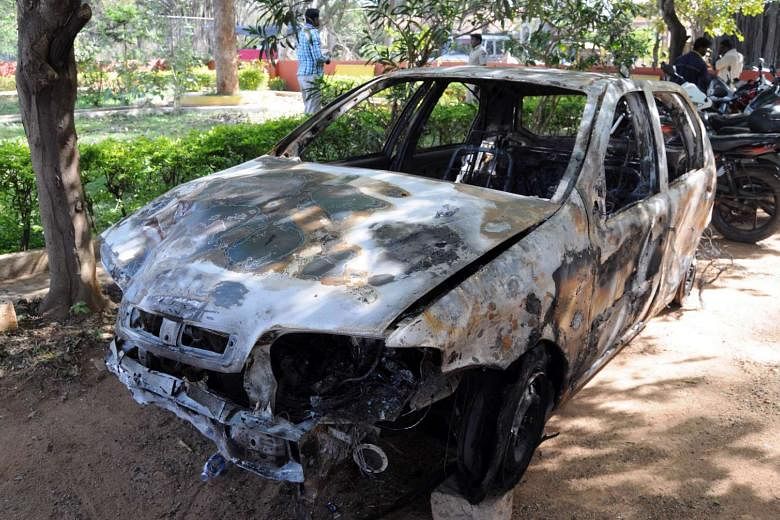Five people have been arrested for an assault on a 21-year-old Tanzanian business student, who was allegedly stripped and beaten by a mob in the IT hub of Bangalore - an incident that has launched a debate on African nationals facing racism in the South Asian country.
The Indian Ministry of External Affairs yesterday condemned the incident and said it had assured its African counterpart of legal action and stringent punishment for those involved in the attack. It said it would also reach out to African students in Bangalore.
Indian External Affairs Minister Sushma Swaraj on Wednesday tweeted that she was "deeply pained over the shameful incident".
The assault happened after a Sudanese man in an inebriated condition drove over a woman sleeping on the roadside in Bangalore, capital city of Karnataka, on Sunday.
While he managed to escape, the mob, which some media reports said ranged from 100 to 200 people, attacked the 21-year-old Tanzanian woman, who had nothing to do with the accident. She had been driving by the area with three friends about 30 minutes later when they were stopped by the mob.
In her complaint, the woman said she was stripped and paraded naked. "Our car was set ablaze. They tugged at my T-shirt and it tore, leaving me without anything. They continued to thrash us and we ran for our lives," she was quoted by the Indian media as saying in her complaint. "A passer-by who offered me his T-shirt was also thrashed."
But Karnataka Home Minister G. Parameshwara said in a press conference: "She was not stripped or paraded naked. It is not a racial attack; it was a reaction to the accident by the Sudanese student."
Still, the victim said she tried to board a bus to escape the mob but was thrown out by its passengers and the mob tore at her clothes.
Mr Parameshwara said: "We have arrested five people for the attack and are questioning others. We will catch the others involved also."
Indian newspaper Deccan Chronicle reported on Wednesday that the presence of African students in the area where the attack took place had caused tension between locals and foreigners. But this is not the first attack on African nationals.
In 2014, three African students were beaten by a mob at a metro station in Delhi for allegedly misbehaving with a woman.
In a separate incident that year, four African women were allegedly molested during a midnight raid led by then Law Minister Somnath Bharti, who claimed he was cracking down on a "drug and prostitution" racket. The racket was never proven to exist.
A year before that, in Goa, a tourist beach destination, locals put up signs saying "Say No to Nigerians, Say No to Drugs". A local minister likened Nigerians to "cancer".
Bangalore, a modern and cosmopolitan city that is home to IT major Infosys and the offices of multinational corporations like Google and Amazon, has also seen earlier attacks. Last March, a mob attacked a Congo national for allegedly harassing a woman. In a separate incident that month, two students from Ivory Coast were attacked.
Said Mr Mathew Philip, executive director of the South India Cell for Human Rights Education and Monitoring: "There are so many incidents of African nationals being harassed and attacked... What we understood is that local people are not happy to have them around. So there is discrimination against them."
On social media too, many concluded the attack was the result of racist attitudes towards African nationals in a country where caste and religious divides run deep.
"I am shocked that this is happening... It is morally wrong. It is definitely racism," said documentary photographer Mahesh Shantaram.
Tanzanian High Commissioner to India John Kijazi, who told the Indian media there was a racist element to the attack, said local people needed to be "sensitised about living in harmony" with African students, while asking the government to ensure the safety of Tanzanian and other African students in India.


